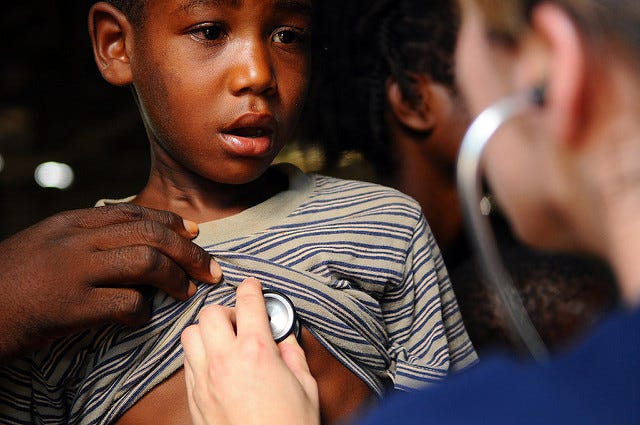Why foreign aid does not lead to economic growth
And why smart leaders of developing nations do not depend on it
As I mentioned in a previous article, there are four major schools of thought among Western experts on how poor nations can develop:
Economist school, who advise developing nations to establish good institutions and free markets
Foreign aid school, who urge wealthy nations to spend more on foreign aid to assist developing nations to get out of “poverty traps”.
Right school, who believes that the poor in all nations need the same political freedoms that wealthy nations enjoy. Once the people have those rights, their nations can grow their way out of their poverty.
Sustainable development school that focuses heavily on renewable energy and less resource-intensive agriculture, transportation, and manufacturing.
In this article, I will compare the advice given by the “Foreign Aid” school to what we have learned from how wealthy nations achieved their wealth in the past.
Most of the following is an excerpt from my second book Promoting Progress: A Radical New Agenda to Create Abundance for All. You can order my e-books at a discounted price at my website, or you can purchase full-price ebooks, paperback, or hardcovers on Amazon.
Other books in my “From Poverty to Progress” book series:
You can read other articles on developing nations, including:
Why developing nations are still poor:
What wealthy nations can do to help developing nations:
What developing nations can do to help themselves:
How developing nations can create competitive export industries
Why Developing nations need to create thriving export industries
What the Foreign Aid School believes
The second school of thought for Western advice for developing nations is dominated by development experts and non-governmental organizations (NGOs). Jeffrey Sachs is the key thinker in this school.
The Foreign aid school, as I will call it, believes that wealthy nations and individuals should spend more on foreign aid to assist developing nations to get out of “poverty traps”. They believe that poor nations are trapped in poverty that only can be overcome with foreign aid.
In general, they argue for increased foreign aid that is targeted at improving education, sanitation, and health care. Once this foreign aid overcomes the poverty traps, these people believe that developing nations can grow into wealthier nations.
Why Foreign Aid Advocates Are Wrong
The advice of foreign aid experts has even bigger problems than the Economist school. Their advice is heavily dependent upon the willingness of wealthy nations to spend lots of money on foreign aid. It is even more heavily dependent upon wealthy nations doing so wisely, and local officials in developing nations not stealing the money to use for their own purposes.
The Foreign aid school views better health care, sanitation, and education as the desired outcome. It is unclear to the extent that they believe that these outcomes is an intermediate step toward self-sustaining economic growth or as an end in itself.
Unfortunately, Foreign aid school presents no evidence that significant gains in health care, sanitation, and education cause long-term widely shared economic growth. To the best of my knowledge, no evidence supports their case in this area.
I believe that the evidence is very clear that significant gains in health care, sanitation, education, and other development metrics are the result of long-term economic growth.
Nor does Foreign aid school have much evidence that the people living in developing nations live in poverty traps in all these domains. As we see more Asian nations transform themselves without significant amounts of foreign aid, it looks like an increasingly unreasonable assumption.
And if a poor nation does not experience long-term economic growth, how will they pay for these programs in the long run? It is naïve to believe that wealthy nations will keep foreign aid flowing forever. At some point in time, developing nations need to take the lead. Without economic growth, I do not see any way out of this conundrum.
Just like economists, foreign aid development experts point to very good things that are the result of progress, not the cause of it.
Health care, sanitation, and education are all good things, but they do not create progress or economic growth. And just like economists give unrealistic advice to overhaul institutions, building a health care, sanitation, and education system is very expensive and time-consuming.
If done correctly, building a health care, sanitation, and education system will lead to benefits that voters will notice, and perhaps it will create a self-sustaining feedback loop for increased funding. But then that leads back to the problem of where the money comes from in the first place, and what you spend it on when you get it.
While well-intentioned, I do not see how foreign aid or domestic government spending in health care, sanitation, and education will lead to long-term sustained economic growth in developing nations. It might make a difference in the quality of poor people’s lives, but that should not be the main goal. Self-sustaining domestic progress based on long-term widely shared economic growth should be the goal.
A nation trapped in poverty with a sophisticated and expensive health care, sanitation, and education infrastructure is simply not sustainable. The economic system will not have a broad enough tax base to fund that infrastructure. Nor is it clear that the infrastructure can be achieved, even with massive amounts of foreign aid.
Ironically, while this school of thought focuses on “poverty traps,” they are advising developing nations to create a different type of poverty trap. Developing nations need to create economic growth, and building vast social infrastructures wastes valuable resources that would be far more effective if used for other purposes.
We need a better path forward.
So what should you do?
Does that mean that you should not donate to foreign aid organizations?
No.
Helping other people who are less well off than you is an inherent good even if it does not lead to long-term widely shared economic growth. Health, education, and sanitation are inherently good things.
Focus on Results, not Feelings
But far too many foreign aid organizations make decisions based on:
How donors feel
How aid workers feel
How the practice makes the organization look (i.e. public relations).
To be truly effective, however, foreign aid organizations should:
Be based on methods that show proven results (ideally with long-term studies using randomized controlled trials)
Not on making you feel good about yourself
Not on showing how much you care
Not on relieving your guilt for having more than other people
My hope is that NGOs will shift their focus to the ultimate goal of promoting long-term widely shared economic growth, but in the short term focusing on Results rather than Good Intentions would be a good first step.
Use your donations to support organizations that show demonstrated Results in developing nations. If NGOs focused 10% of their revenue on identifying practices in randomized controlled trials, that would be even better.
Most people simply do not realize the vast differences in impact differing NGOs have.
But if long-term widely-shared economic growth is the goal, I don’t see that the Foreign aid school has many solutions to offer.
Most of the above is an excerpt from my second book Promoting Progress: A Radical New Agenda to Create Abundance for All. You can order my e-books at a discounted price at my website, or you can purchase full-price ebooks, paperback, or hardcovers on Amazon.
Other books in my “From Poverty to Progress” book series:
You can read other articles on developing nations, including:
Why developing nations are still poor:
What wealthy nations can do to help developing nations:
What developing nations can do to help themselves:












I would agree that foreign aid is not the path to economic growth. In addition, the elites can and often do confiscate control of the aid and use it to reinforce their control and exploitation, and thus to reduce the likelihood of economic growth.
Wow. Another method to "improve" aid. Just get rid of the dammed thing. It's bad enough democracy forces people to give welfare to the lazy bums of our society, but now we have to give handouts to a bunch of third rate countries? The only thing the UN should focus on ensuring freedom of navigation and aviation and territorial integrity. Just rid of the IMF and World Bank as well.